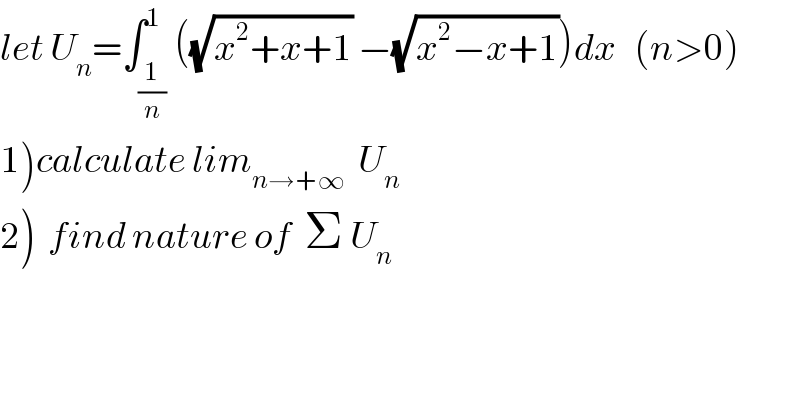
Question Number 63507 by mathmax by abdo last updated on 05/Jul/19

$${let}\:{U}_{{n}} =\int_{\frac{\mathrm{1}}{{n}}} ^{\mathrm{1}} \left(\sqrt{{x}^{\mathrm{2}} +{x}+\mathrm{1}}\:−\sqrt{{x}^{\mathrm{2}} −{x}+\mathrm{1}}\right){dx}\:\:\:\left({n}>\mathrm{0}\right) \\ $$ $$\left.\mathrm{1}\right){calculate}\:{lim}_{{n}\rightarrow+\infty} \:\:{U}_{{n}} \\ $$ $$\left.\mathrm{2}\right)\:\:{find}\:{nature}\:{of}\:\:\Sigma\:{U}_{{n}} \\ $$
Answered by MJS last updated on 05/Jul/19
![lim_(n→+∞) U_n =∫_0 ^1 ((√(x^2 +x+1))−(√(x^2 −x+1)))dx ∫(√(x^2 ±x+1))dx=(1/2)∫(√((2x±1)^2 +3))dx= [t=sinh^(−1) ((2x±1)/(√3)) → dx=(√(x^2 ±x+1))dt] =(3/4)∫(cosh^2 t)dt=(3/8)∫(1+cosh 2t)dt= =(3/8)t+(3/(16))sinh 2t ∫((√(x^2 +x+1))−(√(x^2 −x+1)))dx= =(3/8)(sinh^(−1) ((2x+1)/(√3)) −sinh^(−1) ((2x−1)/(√3)))+(1/4)((2x+1)(√(x^2 +x+1))−(2x−1)(√(x^2 −x+1)))+C lim_(n→+∞) U_n =∫_0 ^1 ((√(x^2 +x+1))−(√(x^2 −x+1)))dx= =−((3−3(√3))/4)+(3/8)sinh^(−1) (√3) −(9/8)sinh^(−1) ((√3)/3) ≈.424928 [=−((3−3(√3))/4)+(3/8)ln (3+2(√3)) −(3/4)ln 3] ΣU_n =+∞](Q63525.png)
$$\underset{{n}\rightarrow+\infty} {\mathrm{lim}}{U}_{{n}} =\underset{\mathrm{0}} {\overset{\mathrm{1}} {\int}}\left(\sqrt{{x}^{\mathrm{2}} +{x}+\mathrm{1}}−\sqrt{{x}^{\mathrm{2}} −{x}+\mathrm{1}}\right){dx} \\ $$ $$\int\sqrt{{x}^{\mathrm{2}} \pm{x}+\mathrm{1}}{dx}=\frac{\mathrm{1}}{\mathrm{2}}\int\sqrt{\left(\mathrm{2}{x}\pm\mathrm{1}\right)^{\mathrm{2}} +\mathrm{3}}{dx}= \\ $$ $$\:\:\:\:\:\left[{t}=\mathrm{sinh}^{−\mathrm{1}} \:\frac{\mathrm{2}{x}\pm\mathrm{1}}{\sqrt{\mathrm{3}}}\:\rightarrow\:{dx}=\sqrt{{x}^{\mathrm{2}} \pm{x}+\mathrm{1}}{dt}\right] \\ $$ $$=\frac{\mathrm{3}}{\mathrm{4}}\int\left(\mathrm{cosh}^{\mathrm{2}} \:{t}\right){dt}=\frac{\mathrm{3}}{\mathrm{8}}\int\left(\mathrm{1}+\mathrm{cosh}\:\mathrm{2}{t}\right){dt}= \\ $$ $$=\frac{\mathrm{3}}{\mathrm{8}}{t}+\frac{\mathrm{3}}{\mathrm{16}}\mathrm{sinh}\:\mathrm{2}{t} \\ $$ $$\int\left(\sqrt{{x}^{\mathrm{2}} +{x}+\mathrm{1}}−\sqrt{{x}^{\mathrm{2}} −{x}+\mathrm{1}}\right){dx}= \\ $$ $$=\frac{\mathrm{3}}{\mathrm{8}}\left(\mathrm{sinh}^{−\mathrm{1}} \:\frac{\mathrm{2}{x}+\mathrm{1}}{\sqrt{\mathrm{3}}}\:−\mathrm{sinh}^{−\mathrm{1}} \:\frac{\mathrm{2}{x}−\mathrm{1}}{\sqrt{\mathrm{3}}}\right)+\frac{\mathrm{1}}{\mathrm{4}}\left(\left(\mathrm{2}{x}+\mathrm{1}\right)\sqrt{{x}^{\mathrm{2}} +{x}+\mathrm{1}}−\left(\mathrm{2}{x}−\mathrm{1}\right)\sqrt{{x}^{\mathrm{2}} −{x}+\mathrm{1}}\right)+{C} \\ $$ $$\underset{{n}\rightarrow+\infty} {\mathrm{lim}}{U}_{{n}} =\underset{\mathrm{0}} {\overset{\mathrm{1}} {\int}}\left(\sqrt{{x}^{\mathrm{2}} +{x}+\mathrm{1}}−\sqrt{{x}^{\mathrm{2}} −{x}+\mathrm{1}}\right){dx}= \\ $$ $$=−\frac{\mathrm{3}−\mathrm{3}\sqrt{\mathrm{3}}}{\mathrm{4}}+\frac{\mathrm{3}}{\mathrm{8}}\mathrm{sinh}^{−\mathrm{1}} \:\sqrt{\mathrm{3}}\:−\frac{\mathrm{9}}{\mathrm{8}}\mathrm{sinh}^{−\mathrm{1}} \:\frac{\sqrt{\mathrm{3}}}{\mathrm{3}}\:\approx.\mathrm{424928} \\ $$ $$\left[=−\frac{\mathrm{3}−\mathrm{3}\sqrt{\mathrm{3}}}{\mathrm{4}}+\frac{\mathrm{3}}{\mathrm{8}}\mathrm{ln}\:\left(\mathrm{3}+\mathrm{2}\sqrt{\mathrm{3}}\right)\:−\frac{\mathrm{3}}{\mathrm{4}}\mathrm{ln}\:\mathrm{3}\right] \\ $$ $$\Sigma{U}_{{n}} =+\infty \\ $$
Commented bymathmax by abdo last updated on 05/Jul/19

$${thank}\:{you}\:{sir}\:{mjs}\:{for}\:{those}\:{hard}\:{works}. \\ $$
Commented byMJS last updated on 05/Jul/19

$$\mathrm{you}'\mathrm{re}\:\mathrm{welcome}.\:\mathrm{you}\:\mathrm{know}\:\mathrm{I}\:\mathrm{love}\:\mathrm{integrals}... \\ $$
